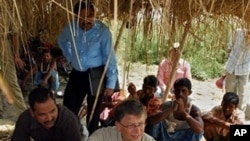Microsoft founder Bill Gates says wealthy nations and private sector donors should be able to make up more than $2.6 billion in funding needed to fight polio through 2012. Gates spoke in Nigeria where he met with officials responsible for polio vaccinations.
The World Health Organization is facing a budget shortfall in its 2010 through 2012 campaign to eradicate polio.
But even as wealthy economies continue to recover from the global financial crisis, computer software developer Bill Gates believes the $2.6 billion that is needed can be raised.
"We are going to the rich world donors at a time when their budgets are tight," Gates said. "But between what our foundation will do, what the other donors will do, I feel quite sure that we will be able to fund this fight even though that is not an easy thing. Money is very tight."
The billionaire philanthropist spoke to reporters in Abuja where he met with officials responsible for Nigeria's anti-polio campaign. On his last visit in February 2009, he says it looked like Nigeria might make the least progress of the four countries most at risk, which include India, Pakistan, and Afghanistan.
"In fact, as we sit here about 16 months since that visit, we can say that things have gone very well," Gates said. "And although some of that is good luck, and we need to do even better, a lot of it is because there is better coverage of the vaccine. When we talk about polio, the key is to have all the kids, or at least 90 percent, get three or more doses of the vaccine."
Nigeria has recorded its lowest level of polio infections this year, with just three cases. Last year there were 228. Immunization has risen from less than two-thirds of children last year to more than 70 percent this year.
There is still polio in neighboring Niger and Chad, and Gates says there are efforts underway in those countries to fight the disease as well. But he says that makes it even more important to have high-vaccine rates in Nigeria to check polio's spread.
"As we get vaccine coverage up diseases like measles, where we have a very good vaccine, or some like diarrhoeal disease or respiratory [disease] where there are some new vaccines that in the years ahead will be added, the number of lives that can be saved is really huge. If you go further out, maybe five years with luck, we will be able to add a malaria vaccine," Gates said.
Gates was joined by Dr. Mohammed Ali Pate, who heads Nigeria's primary health care agency.
"We can do wonders if we make up our minds and work hard towards it. But the job is not done," Pate said. "There are still remaining gaps, and there are still challenges.
The Microsoft founder met with some of Nigeria's top business leaders during his visit and says they have committed to sharing their wealth, much as he has done since he and his wife established the Bill and Melinda Gates Foundation.
"I feel very lucky that the work I did at Microsoft generated so much wealth," Gates said. "And then there is the question of what to do with that wealth. I decided that passing that to my children would not be a great thing for them or for society. There would be nothing good about that. And so then the challenge I had was, 'OK, where should it go to have the most impact on society?'"
In addition to polio and malaria prevention, the Gates Foundation is also investing in maternal and child health with $1.5 billion of aid for the next five years to support family planning, health, and nutrition programs in developing countries.
Microsoft Founder Says Aid Should Meet Polio Funding Shortfall




